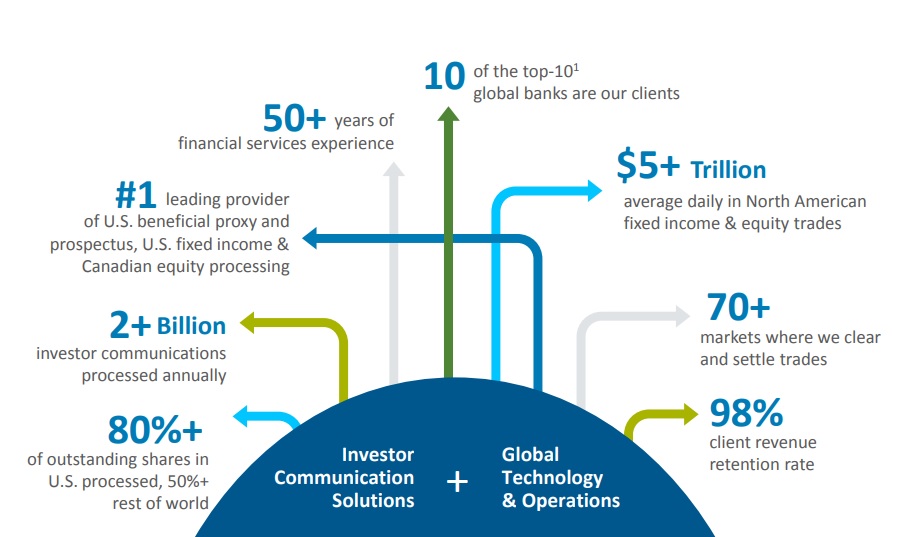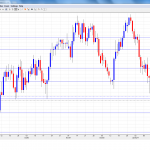Sometimes, the most boring, under-the-radar businesses prove to be the best long-term investments, and Broadridge Financial could be one of them.

In fact, Broadridge was called “the most important firm on Wall Street that you’ve never heard of” by Dick Grasso, the former CEO and chairman of the New York Stock Exchange.
Paying higher dividends every year since 2007 and recording double-digit annualized dividend growth, Broadridge is a dividend achiever that boasts an impressive track record.
Let’s take a closer look at this high quality dividend growth stock to see if the company’s future remains bright and if today could be a reasonable time to consider adding to the stock to a diversified dividend portfolio.
Business Overview
Broadridge Financial serves banks, brokerage firms, mutual funds, clearing firms, bond issuers, hedge funds, and financial advisors by handling many of their administrative but mission-critical tasks such as shareholder record keeping, investor communications, billing, tax reporting, clearing and settling trades, and more.
The company has been in business for more than 50 years, but it operated as a division of Automatic Data Processing (ADP) until spinning out as an independent company in 2007.
Broadridge operates in two segments.
Investor Communication Solutions accounts for 80% of total sales. The majority of this segment processes and distributes proxy materials to investors in equity securities and mutual funds and helps with vote processing.
Many public companies have thousands or even millions of shareholders, but the company does not know who they all are because that data is held across many different brokers.
It would be impractical for companies to work with all of the brokers through which their shares are held beneficially, so they turn to Broadridge to ensure that proxy materials are distributed to all beneficial owners and that their votes are accurately reported.
The SEC requires public companies to reimburse brokers for the expense of distributing stockholder communications to beneficial owners, so Broadridge bills the public company for its proxy services using fees established by the NYSE, takes its cut, and submits to the broker its portion of the fees.
Broadridge Financial dominates this market, processing over 80% of the outstanding shares in the U.S. last year (up from 70% in 2007).
The company also processed over two billion investor communications through either paper or electronic channels and offers dozens of other services – prospectus fulfillment services; electronic delivery solutions for documents including trade confirmations, tax documents, and account statements; marketing communications; tax services; and much more.
The Global Technology and Operations segment accounts for the remaining 20% of Broadridge Financial’s sales and provides systems that support real-time processing of securities transactions.
Its services automate the transaction lifecycle of trading operations, from order capture and execution through trade confirmation, settlement, custody, and accounting. Essentially, Broadridge allows brokers to avoid building out costly infrastructure to support the basic back-end processes of electronic trading.
Broadridge Financial processes over $5 trillion in equity and fixed income trades per day of U.S. and Canadian securities, including 60% of U.S. fixed income trades and providing services to 18 of the 23 primary dealers of fixed income securities in the U.S.

Source: Broadridge Financial
Across both of its segments, Broadridge has made numerous bolt-on acquisitions over the years to expand its suite of services into adjacent markets, the latest being Spence Johnson, which is a leading provider of global institutional data and intelligence to the asset management industry.
While most investors associate Broadridge Financial with proxy services and securities processing, the company has over 150 additional products that are increasingly driving incremental growth.
Altogether, about 91% of Broadridge Financial’s total revenue is recurring, and the company regularly achieves a client revenue retention rate in excess of 98%. From a geographical perspective, over 80% of Broadridge’s income is generated in the U.S.
Business Analysis
With 91% of its sales recurring and a client retention rate of 98% (100% of Broadridge Financial’s associates have a bonus tied to customer satisfaction), Broadridge has one of the sturdiest business models you can find. Serving the financial services area comes with some extra regulatory risk, but the benefits the industry offers have far outweighed them so far.
Financial services firms demand accuracy, reliability, and security. All shareholders must have the opportunity to vote their proxy form. All trades must be fairly settled and accounted for. All account statements need to be correct for tax purposes. All data contains extremely sensitive personal information and must be kept private.
You get the point – these tasks are mundane, complex, and well outside of financial services firms’ core operations, but each is mission-critical.
Broadridge Financial has spent approximately $2 billion the last decade to broaden its product lineup and enhance technical offerings. The company continues to invest several hundred million dollars in technology each year and, in some cases, has spent over 50 years perfecting the features available in its products.
Broadridge Financial now has a dominant market share in a number of its products, represents a relatively small proportion of clients’ overall operating expenses, and, most importantly, has earned their trust. It’s not worth switching to another vendor for many of these reasons alone.











Leave A Comment